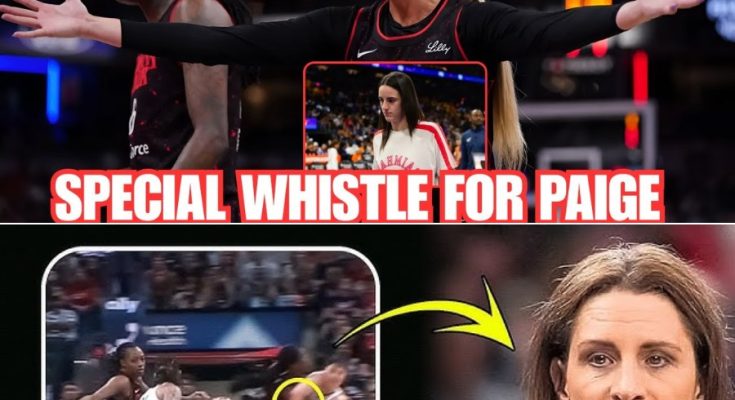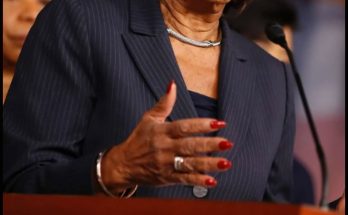
The WNBA is facing a storm of scrutiny and heated debate after a recent series of games that have left fans, analysts, and players questioning the fairness and consistency of officiating in the league. At the center of the controversy is Sophie Cunningham, the standout guard known for her aggressive style and fearless play, who has publicly criticized referees for what she claims is favoritism toward Paige Bueckers, one of the league’s rising stars. Cunningham’s statements have sparked a wider conversation about bias, transparency, and the impact of officiating decisions on the careers and health of other elite players, most notably Caitlin Clark, whose much-anticipated comeback now appears uncertain.
Cunningham’s remarks came immediately following a high-profile game in which Bueckers appeared to receive unusually lenient treatment from the referees. Several calls that went in Bueckers’ favor were deemed questionable by commentators, while comparable fouls committed by Cunningham herself and other players were penalized strictly. In a post-game interview, Cunningham expressed frustration and concern, noting that the perceived bias not only affects the competitive balance of the league but also creates unnecessary pressure on players trying to return from injuries.
“Every time I step on the court, I want to compete on an even playing field,” Cunningham said. “It’s disheartening to see that the rules can be applied differently for different players. I’m not just speaking for myself—I’m speaking for everyone who expects fairness in this league.” Her comments were amplified by clips circulating on social media, showing multiple instances of what many viewers interpreted as preferential treatment for Bueckers, from questionable fouls called against opponents to advantageous positioning during critical moments.
This revelation has far-reaching implications, particularly for Caitlin Clark, a guard whose return from injury was supposed to reinvigorate her team’s season. Clark has been sidelined due to a significant injury, and her recovery timeline was already a matter of intense scrutiny. Cunningham’s allegations introduce an added layer of uncertainty, suggesting that the playing field she will return to might be compromised not just by the physical challenges of injury but also by inconsistent officiating. Analysts argue that if referees continue to favor certain players, Clark’s reintegration could be fraught with difficulty, and the league’s credibility could take a hit.
The situation has also reignited debates about transparency in WNBA officiating. Historically, professional leagues have struggled with public perception when it comes to referee bias. Unlike college basketball or international competitions, the WNBA is under constant media scrutiny, and fans have become more vocal in their assessment of referee decisions. Cunningham’s public statements have only intensified the pressure on the league to address these concerns head-on. While the WNBA has consistently defended its officiating protocols, promising training, review processes, and accountability, the current controversy raises questions about whether those measures are sufficient.
Social media reactions have been swift and polarized. Some fans have praised Cunningham for her courage in speaking out, calling her a voice for fairness and integrity. Others argue that her comments may be fueled by frustration and competitive pressure, cautioning that accusations of bias can have unintended consequences if not substantiated by clear evidence. Analysts on sports networks have dissected game footage, highlighting key moments where Bueckers’ calls seemed inconsistent with the usual standards applied across the league. The debate has become a trending topic not just in basketball circles but across broader sports media, drawing comparisons with similar controversies in the NBA and international leagues.
Beyond the court, the controversy raises questions about player safety and workload management. Preferential treatment for certain players, whether intentional or not, can place others at increased risk of injury. For athletes like Clark, who are returning from significant injuries, this inconsistency can be particularly dangerous. Cunningham herself noted that in high-stakes games, the physical toll is already immense, and any uneven enforcement of rules magnifies that burden. Coaches and sports medicine experts have echoed this concern, emphasizing that fair officiating is not just about competition—it is about protecting athletes’ long-term health.
League officials have responded cautiously, acknowledging Cunningham’s statements while urging players and fans to maintain perspective. A spokesperson for the WNBA issued a statement emphasizing the professionalism of its referees, noting that the league regularly reviews game footage and referee performance to ensure standards are upheld. However, officials stopped short of directly addressing the allegations of favoritism toward Bueckers, leaving room for speculation and ongoing debate.
The implications for Clark’s comeback are particularly critical. Analysts have noted that if referees continue to demonstrate inconsistent behavior, Clark may face additional challenges beyond physical recovery. Adapting to officiating that favors certain players can alter game strategy, affect team chemistry, and influence her confidence on the court. With Clark considered a key figure in her team’s championship aspirations, any disruption in competitive balance could have ripple effects on the league’s standings, playoff prospects, and overall viewership.
Cunningham’s intervention also brings into focus broader issues of player empowerment and accountability within the WNBA. Players increasingly feel empowered to speak out about perceived injustices, whether related to officiating, league policies, or treatment by teams and management. By voicing her concerns publicly, Cunningham not only highlights a specific controversy but also underscores a growing trend in professional sports: athletes demanding transparency and fairness in every aspect of their career. This trend, while empowering for players, can be challenging for league officials who must balance public perception, media scrutiny, and operational integrity.
Commentators have pointed out that the controversy could affect fan engagement and ratings, particularly if high-profile players such as Bueckers and Clark are perceived to receive unequal treatment. Fans expect competitive integrity and drama born from skill, not inconsistent officiating. If the league does not address these concerns, viewership could be impacted, sponsorships might be scrutinized, and the overall narrative around the WNBA could shift in a way that undermines its reputation.
Adding to the tension, insiders suggest that there may be a broader pattern in how referees handle star players. While explicit bias is difficult to prove, the perception of favoritism can be just as damaging as actual favoritism, especially in professional sports where public trust and league credibility are paramount. Analysts have suggested that the league implement more transparent referee evaluations, publicly release metrics on calls, and provide additional training to mitigate unconscious biases. Doing so could restore confidence among players, coaches, and fans alike.
Sophie Cunningham’s decision to speak out also sheds light on the human side of professional sports. Behind every call, every whistle, and every highlight reel is a network of relationships, expectations, and pressures that affect players’ performance. Cunningham’s frustration resonates because it speaks to a shared experience among athletes: the desire to compete fairly and have their efforts judged on merit, not external favoritism. Her courage in addressing these issues publicly demonstrates a commitment to integrity that transcends individual games or personal statistics.
For Caitlin Clark, the next few weeks are pivotal. Her physical recovery will require careful management, but the psychological dimension introduced by Cunningham’s revelations cannot be ignored. Returning to a league where perceived bias exists could test Clark’s mental resilience, team cohesion, and ability to perform at the highest level. Coaches, teammates, and medical staff will need to collaborate closely to ensure that she can navigate these challenges effectively while maintaining focus on her recovery and on-court contributions.
As the WNBA moves forward, this controversy could be a turning point. Cunningham’s statements, the ensuing debate, and the scrutiny of officiating practices may lead to systemic changes, including enhanced training for referees, more transparent review processes, and a stronger emphasis on player welfare. It is a reminder that professional sports are not only about athletic excellence but also about fairness, accountability, and the trust of those who dedicate their lives to the game.
In the meantime, fans will be watching closely. Every game will be analyzed not only for the skill of the players but also for the integrity of officiating. Every whistle, every call, and every decision will be scrutinized in light of Cunningham’s remarks. The spotlight on Bueckers’ treatment and Clark’s uncertain return adds a dramatic layer to the season, creating narratives that extend beyond points, rebounds, and assists. The stakes are high, the tension is palpable, and the WNBA finds itself at a crossroads where fairness, perception, and player advocacy intersect.
Ultimately, Sophie Cunningham’s courageous stand serves as a catalyst for broader reflection within the league. By challenging perceived bias and advocating for transparency, she amplifies the voices of players who demand fairness, and she forces both fans and officials to reconsider how games are officiated and evaluated. Whether this leads to immediate changes or sparks a gradual cultural shift, one thing is clear: the conversation about integrity in the WNBA has been ignited, and it will continue to shape the league, its players, and the fans who passionately follow every game.
As the season progresses, all eyes will remain on Paige Bueckers, Caitlin Clark, and Sophie Cunningham. Each player represents not only their team but also the larger narrative of fairness, resilience, and the pursuit of excellence in women’s professional basketball. The decisions made by referees, the responses of the league, and the courage of players to speak out will define this season in ways that extend far beyond the scoreboard. The WNBA stands at a critical moment where integrity, transparency, and competitive balance are not just ideals—they are imperatives that will determine the league’s future and the trust of its devoted fanbase.



